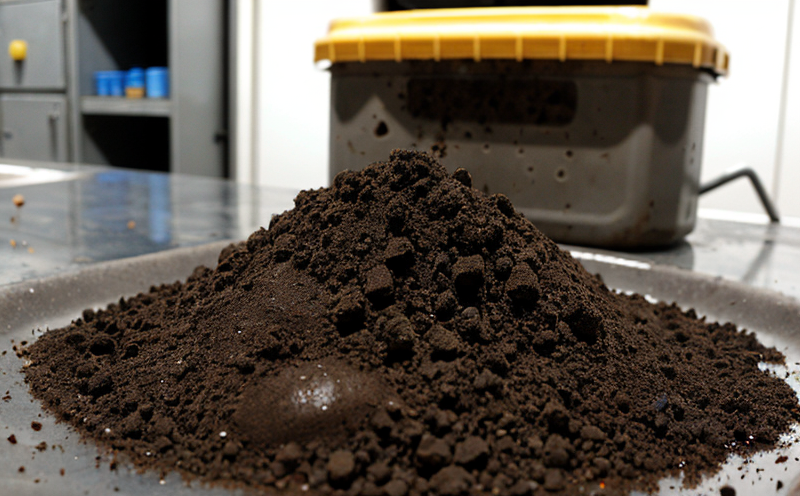Asphalt Residue Contaminant Screening
The process of asphalt residue contaminant screening is critical in ensuring that infrastructure materials are safe and compliant with international standards. Quality managers, compliance officers, R&D engineers, and procurement professionals rely on this service to verify the integrity and purity of asphalt products before they enter the market or are used in construction projects.
Asphalt, a crucial component in road construction and paving, is composed primarily of bitumen, aggregates, and additives. Contaminants can arise from various sources including raw materials, processing, transportation, and storage conditions. These contaminants may include heavy metals, organic solvents, polycyclic aromatic hydrocarbons (PAHs), and other hazardous substances that pose risks to human health and the environment.
The primary objective of our asphalt residue contaminant screening service is to identify potential hazards associated with these impurities and ensure they do not exceed permissible limits set by relevant standards. This service provides peace of mind for clients who are responsible for maintaining high-quality standards in their operations.
Our team employs advanced analytical techniques such as gas chromatography-mass spectrometry (GC-MS), inductively coupled plasma mass spectrometry (ICP-MS), and Fourier transform infrared spectroscopy (FTIR) to detect trace levels of contaminants. These methods offer precision, accuracy, and reproducibility necessary for reliable test results.
For accurate analysis, specimens must be prepared according to strict protocols. This typically involves sampling from the source or point of use, followed by grinding, sieving, and homogenization to ensure representativeness. The prepared sample is then analyzed using appropriate instrumentation tailored to detecting specific contaminants.
The results generated are comprehensive and detailed reports that include detection limits, concentration levels, and comparison against relevant standards like ISO 25381-4 for asphalt paving mixtures or ASTM D976 for asphalt binder testing. Compliance with these standards helps ensure the safety of infrastructure projects while protecting public health.
By utilizing our asphalt residue contaminant screening service, clients can make informed decisions about their materials, thereby reducing risk and enhancing overall quality assurance practices within their organizations.
Scope and Methodology
| Test Parameters | Description | Methodology |
|---|---|---|
| Heavy Metals (Cadmium, Lead, Mercury) | Detects trace amounts of these elements which can be harmful if present in high concentrations. | ICP-MS analysis following EPA Method 23. |
| Polyaromatic Hydrocarbons (PAHs) | Identifies and quantifies PAHs that may indicate fuel contamination or other issues. | GC-MS analysis per ASTM D7890. |
| Organic Solvents | Detects volatile organic compounds (VOCs) which could affect air quality if not controlled properly. | Air sampling followed by GC-MS identification. |
| Polycyclic Aromatic Hydrocarbons (PAHs) | Identifies PAHs that might indicate fuel contamination or other issues. | GC-MS analysis per ASTM D7890. |
| Sulfur Content | Measures sulfur content to ensure compliance with environmental regulations. | Air sampling followed by GC-MS identification. |
| Acceptance Criteria | Description | Methodology |
|---|---|---|
| Total Organic Carbon (TOC) | Ensures low levels of organic matter that could lead to corrosion or other problems. | TOC measurement using TOC analyzer following ASTM D5457. |
| Pesticide Residues | Checks for any pesticide residues which might indicate improper storage conditions. | GC-MS analysis per EPA Method 1613. |
| Silica Content | Verifies the amount of silica to ensure optimal performance and longevity of asphalt products. | X-ray fluorescence (XRF) spectroscopy following ASTM D5284. |
| Water Content | Makes sure there is minimal water content which can affect bonding properties. | Drying at 105°C ± 3°C for 6 hours followed by weighing to determine moisture content. |
The methodology employed ensures that the testing process adheres strictly to recognized standards and guidelines ensuring accurate results. Our experienced technicians operate state-of-the-art equipment capable of detecting even minute traces of contaminants, providing clients with confidence in their material selection processes.
Customer Impact and Satisfaction
- Ensures compliance with international safety regulations and industry standards.
- Reduces the risk of product liability lawsuits by minimizing potential health hazards from contaminated asphalt products.
- Promotes sustainable practices by helping manufacturers adhere to environmental protection measures during production processes.
- Enhances brand reputation through consistent quality assurance practices that meet or exceed customer expectations.
- Aids in regulatory compliance ensuring that all produced goods comply with local, national, and international laws governing product safety and environmental impact.
- Provides peace of mind to clients who need to trust the integrity of their purchased materials without having to perform additional testing themselves.
Our commitment to excellence has earned us a reputation for reliability and accuracy among our customers. We pride ourselves on delivering services that not only meet but exceed expectations, thus fostering long-term relationships based on mutual respect and satisfaction.
Environmental and Sustainability Contributions
The asphalt residue contaminant screening service plays an essential role in promoting environmental sustainability by helping prevent the release of harmful contaminants into the environment. By identifying and mitigating these risks early in the production or usage cycle, we contribute to cleaner air, water, and soil.
This service also supports sustainable practices within industries that rely heavily on asphalt products for infrastructure development. Through our efforts, we help ensure that every paving project contributes positively towards reducing negative impacts on the environment.
Our commitment extends beyond just testing; it involves educating clients about best practices regarding material handling and storage to further minimize contamination risks throughout their supply chain operations.





